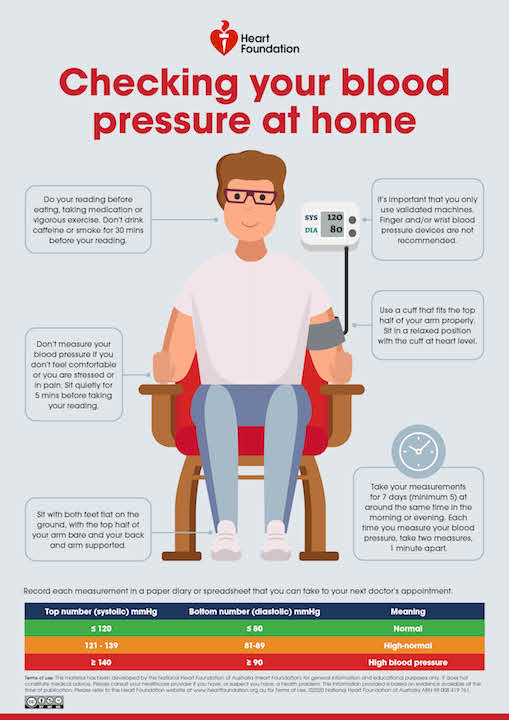Aussies are being implored not to discount the dangers of high blood pressure, as new research suggests few think of the ticking time bomb behind almost half of cardiovascular disease deaths.
The Heart Foundation’s warning comes after its survey of more than 3500 Australians on how they would reduce their risk of heart disease found just one per cent would lower or monitor their blood pressure.
The heart health charity says it’s never been more important for people with high blood pressure to keep it in check, and has released new online tips on measuring your blood pressure at home to guide patients during the COVID-19 pandemic.
One in three adults – more than six million Australians – has high blood pressure. Left untreated or undetected, this common condition can lead to irreversible blood vessel damage, raising your risk of a heart attack or stroke.
Emerging evidence suggests that people with high blood pressure may be more vulnerable to serious complications if infected with the COVID-19 virus compared to the general population.
Heart Foundation Risk Reduction Manager, Natalie Raffoul, says the survey results indicate too many Australians are putting their health on the line by not being aware of the risk that high blood pressure poses on their heart health.
“High blood pressure is known as a silent killer because there are often no obvious signs or symptoms, yet it puts you at higher risk of a heart attack or stroke. The only way to find out if you need to do something about your blood pressure is to have it checked regularly,” Ms Raffoul said.
“The good news is high blood pressure can be controlled through lifestyle changes such as maintaining a healthy weight, keeping active, limiting alcohol, eating a healthy diet and being smoke-free. In more serious cases, it can be managed with medications.
“If you have high blood pressure, now is an important time to look after it. This includes continuing to take your medications as prescribed, following a heart-healthy lifestyle, and staying in touch with your GP.”
You may also need to keep track of your blood pressure numbers – but those monitoring their levels in lockdown should check they are using a suitable machine before rolling up their sleeves.
“Many of the devices sold online are not validated, so ensure you’re using an approved machine if monitoring your blood pressure at home between doctor’s appointments,” Ms Raffoul said.
“Wrist and finger blood pressure measuring devices are not recommended and can potentially affect the accuracy of your readings. Check the British Society of Hypertension website for a list of validated devices, or buy from a trusted source like your local pharmacy.”
In the Heart Foundation’s survey this year of 3633 Australian adults on their knowledge of how to reduce their risk of heart disease, most nominated exercise (69%) or a healthy diet (65%). Very few would focus on lowering or monitoring their blood pressure (1%).
“A healthy lifestyle is important, but it’s also important to keep an eye on clinical risk factors such as high blood pressure or high cholesterol. Close to one in two heart disease deaths are attributable to high blood pressure, so knowing your risks and keeping your blood pressure within a normal range is a key part of protecting your heart,” Ms Raffoul said.
“If you’re 18 or over, the Heart Foundation recommends that you get your blood pressure checked at least every two years. If you are 45 and over, you should get your blood pressure checked as part of a regular, comprehensive Heart Health Check.”
Monitoring blood pressure at home
For the best results, you should:
- Only use validated machines. Finger and wrist devices are not recommended.
- Use a cuff that fits the top half of your arm properly.
- Take your measurements for seven days (minimum five) at around the same time in the morning or evening.
- Take your reading before eating, taking medication or vigorous exercise.
- Don’t drink caffeine or smoke for 30 minutes before your reading (and if you smoke, speak to your doctor about quitting).
- Don’t measure your blood pressure if you don’t feel comfortable, are stressed or in pain.
To learn more about blood pressure and your heart, visit the Heart Foundation website or call the Helpline on 13 11 12.
































